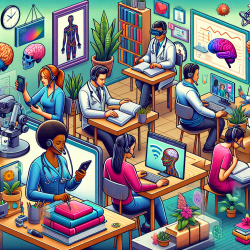Introduction
The landscape of clinical social work education is evolving, with simulation-based learning emerging as a powerful tool for developing essential competencies. The research article "Editorial: The Use of Simulation in Advancing Clinical Social Work Education and Practice" provides a comprehensive overview of how simulation can enhance the educational experience and prepare practitioners for real-world challenges. This blog will explore key insights from the article and offer practical guidance for implementing simulation-based learning in clinical social work education.
The Role of Simulation in Clinical Social Work Education
Simulation-based learning has become an integral part of clinical social work education, providing students with opportunities to practice skills in a controlled, risk-free environment. The research highlights several benefits of simulation, including:
- Competency Development: Simulations are designed to mimic real-life scenarios, allowing students to develop and refine their skills in a realistic setting.
- Feedback and Reflection: Immediate feedback and the opportunity for reflective practice enhance learning outcomes and help students internalize new skills.
- Interprofessional Collaboration: Simulation-based learning often involves collaboration with other health professionals, fostering a holistic approach to client care.
Implementing Simulation-Based Learning
For practitioners looking to incorporate simulation-based learning into their educational programs, the following strategies are recommended:
- Define Competencies: Clearly articulate the competencies that students are expected to develop through simulation. This will guide the design and implementation of simulation scenarios.
- Utilize Technology: Leverage virtual simulation technologies to provide flexible and accessible learning opportunities, especially in remote or online settings.
- Integrate Feedback Mechanisms: Incorporate structured feedback sessions and reflective practices to maximize the learning potential of simulations.
Virtual Simulation and Telehealth Training
The COVID-19 pandemic has accelerated the adoption of telehealth services, highlighting the need for social work education to include training in this area. Virtual simulations offer an effective way to prepare students for telehealth practice by simulating remote client interactions. The research suggests that incorporating telehealth scenarios into simulation-based learning can enhance students' comfort and competence in delivering services remotely.
Conclusion
Simulation-based learning represents a significant advancement in clinical social work education, offering a data-driven approach to developing essential competencies. By embracing this innovative pedagogy, educators can better prepare students for the complexities of modern social work practice. For practitioners and educators interested in exploring this topic further, the original research paper provides a wealth of information and can be accessed here: Editorial: The Use of Simulation in Advancing Clinical Social Work Education and Practice.










